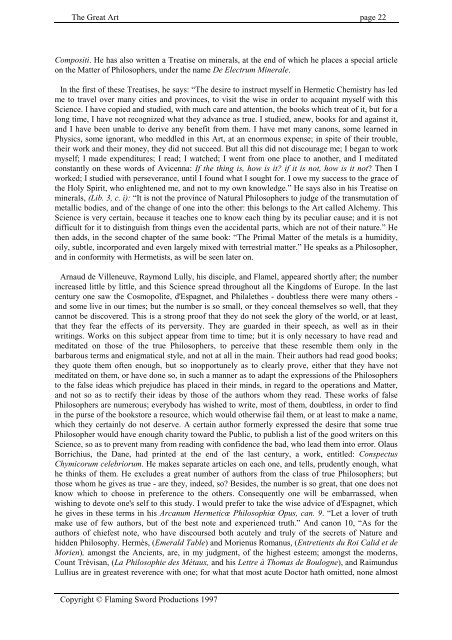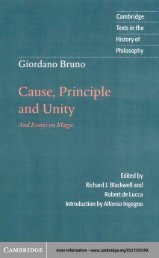The Great Art
You also want an ePaper? Increase the reach of your titles
YUMPU automatically turns print PDFs into web optimized ePapers that Google loves.
<strong>The</strong> <strong>Great</strong> <strong>Art</strong> page 22<br />
Compositi. He has also written a Treatise on minerals, at the end of which he places a special article<br />
on the Matter of Philosophers, under the name De Electrum Minerale.<br />
In the first of these Treatises, he says: “<strong>The</strong> desire to instruct myself in Hermetic Chemistry has led<br />
me to travel over many cities and provinces, to visit the wise in order to acquaint myself with this<br />
Science. I have copied and studied, with much care and attention, the books which treat of it, but for a<br />
long time, I have not recognized what they advance as true. I studied, anew, books for and against it,<br />
and I have been unable to derive any benefit from them. I have met many canons, some learned in<br />
Physics, some ignorant, who meddled in this <strong>Art</strong>, at an enormous expense; in spite of their trouble,<br />
their work and their money, they did not succeed. But all this did not discourage me; I began to work<br />
myself; I made expenditures; I read; I watched; I went from one place to another, and I meditated<br />
constantly on these words of Avicenna: If the thing is, how is it? if it is not, how is it not? <strong>The</strong>n I<br />
worked; I studied with perseverance, until I found what I sought for. I owe my success to the grace of<br />
the Holy Spirit, who enlightened me, and not to my own knowledge.” He says also in his Treatise on<br />
minerals, (Lib. 3, c. i): “It is not the province of Natural Philosophers to judge of the transmutation of<br />
metallic bodies, and of the change of one into the other: this belongs to the <strong>Art</strong> called Alchemy. This<br />
Science is very certain, because it teaches one to know each thing by its peculiar cause; and it is not<br />
difficult for it to distinguish from things even the accidental parts, which are not of their nature.” He<br />
then adds, in the second chapter of the same book: “<strong>The</strong> Primal Matter of the metals is a humidity,<br />
oily, subtle, incorporated and even largely mixed with terrestrial matter.” He speaks as a Philosopher,<br />
and in conformity with Hermetists, as will be seen later on.<br />
Arnaud de Villeneuve, Raymond Lully, his disciple, and Flamel, appeared shortly after; the number<br />
increased little by little, and this Science spread throughout all the Kingdoms of Europe. In the last<br />
century one saw the Cosmopolite, d'Espagnet, and Philalethes - doubtless there were many others -<br />
and some live in our times; but the number is so small, or they conceal themselves so well, that they<br />
cannot be discovered. This is a strong proof that they do not seek the glory of the world, or at least,<br />
that they fear the effects of its perversity. <strong>The</strong>y are guarded in their speech, as well as in their<br />
writings. Works on this subject appear from time to time; but it is only necessary to have read and<br />
meditated on those of the true Philosophers, to perceive that these resemble them only in the<br />
barbarous terms and enigmatical style, and not at all in the main. <strong>The</strong>ir authors had read good books;<br />
they quote them often enough, but so inopportunely as to clearly prove, either that they have not<br />
meditated on them, or have done so, in such a manner as to adapt the expressions of the Philosophers<br />
to the false ideas which prejudice has placed in their minds, in regard to the operations and Matter,<br />
and not so as to rectify their ideas by those of the authors whom they read. <strong>The</strong>se works of false<br />
Philosophers are numerous; everybody has wished to write, most of them, doubtless, in order to find<br />
in the purse of the bookstore a resource, which would otherwise fail them, or at least to make a name,<br />
which they certainly do not deserve. A certain author formerly expressed the desire that some true<br />
Philosopher would have enough charity toward the Public, to publish a list of the good writers on this<br />
Science, so as to prevent many from reading with confidence the bad, who lead them into error. Olaus<br />
Borrichius, the Dane, had printed at the end of the last century, a work, entitled: Conspectus<br />
Chymicorum celebriorum. He makes separate articles on each one, and tells, prudently enough, what<br />
he thinks of them. He excludes a great number of authors from the class of true Philosophers; but<br />
those whom he gives as true - are they, indeed, so? Besides, the number is so great, that one does not<br />
know which to choose in preference to the others. Consequently one will be embarrassed, when<br />
wishing to devote one's self to this study. I would prefer to take the wise advice of d'Espagnet, which<br />
he gives in these terms in his Arcanum Hermeticœ Philosophiœ Opus, can. 9. “Let a lover of truth<br />
make use of few authors, but of the best note and experienced truth.” And canon 10, “As for the<br />
authors of chiefest note, who have discoursed both acutely and truly of the secrets of Nature and<br />
hidden Philosophy. Hermès, (Emerald Table) and Morienus Romanus, (Entretients du Roi Calid et de<br />
Morien), amongst the Ancients, are, in my judgment, of the highest esteem; amongst the moderns,<br />
Count Trévisan, (La Philosophie des Métaux, and his Lettre à Thomas de Boulogne), and Raimundus<br />
Lullius are in greatest reverence with one; for what that most acute Doctor hath omitted, none almost<br />
Copyright © Flaming Sword Productions 1997

















